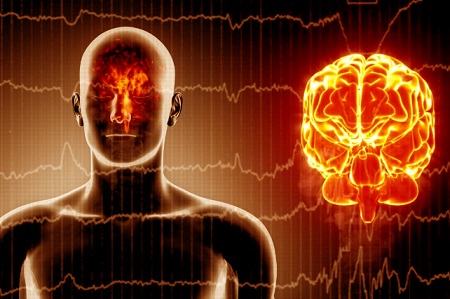Nikhil Prasad Fact checked by:Thailand Medical News Team Oct 24, 2024 5 months, 3 weeks, 11 hours, 2 minutes ago
Medical News: Key Insights into Omicron’s Lingering Mental Health Effects
In a groundbreaking study led by researchers from Chongqing Medical University in China, a unique brain wave pattern, referred to as EEG microstate class B, has been identified as a major risk factor for persistent psychiatric symptoms following Omicron infection. This discovery is opening new doors to understanding how the Omicron variant of SARS-CoV-2 affects mental health and may offer new avenues for early diagnosis and treatment.
 EEG Patterns Reveal Psychiatric Risk After SARS-CoV-2 Omicron Infection
Study Uncovers Critical Brain Activity Changes
EEG Patterns Reveal Psychiatric Risk After SARS-CoV-2 Omicron Infection
Study Uncovers Critical Brain Activity Changes
Researchers from Chongqing Medical University's Neurology Department and its Institutes of Neuroscience have found that EEG microstate class B, a specific brainwave pattern, plays a significant role in psychiatric outcomes for patients who have recovered from Omicron infections but are still experiencing mental health issues. The study included 31 patients, all of whom had their first onset of psychiatric symptoms after contracting the SARS-CoV-2 Omicron variant. The patients were divided into two groups based on their recovery - 19 patients who experienced psychiatric remission and 12 who did not.
This
Medical News report will explore how the research team measured brain activity through EEG scans and what their findings reveal about the long-term psychiatric effects of the Omicron variant.
What Are EEG Microstates?
EEG (Electroencephalography) is a technique that records brain activity. The human brain’s complex neural network emits electrical signals that can be categorized into different microstates. These microstates represent different states of brain function. In this study, four common EEG microstate classes (A, B, C, and D) were observed. Each class is associated with a different brain function, such as processing sensory input or attention.
Class B, the focus of this study, is associated with the brain's visual network. Changes in its occurrence could reflect disturbances in brain connectivity - a key feature of many psychiatric disorders.
How Was the Study Conducted?
The study was designed to determine whether EEG microstates could be used as early biomarkers to predict the persistence of psychiatric symptoms in Omicron-recovered patients. To do this, the team examined several EEG features in the patients’ brainwaves, particularly focusing on the duration and occurrence of microstate class B.
Patients’ psychiatric symptoms were measured using the Brief Psychiatric Rating Scale (BPRS) both at admission and discharge. Those whose BPRS scores dropped by at least 20% were considered to be in remission, while those whose symptoms persisted fell into the non-remission group.
Key Findings of the Study
-Higher Occurrence of EEG Microstate Class B in Non-Remission Group
t;
One of the most significant findings was that the non-remission group had a higher occurrence of EEG microstate class B at admission compared to the remission group. This means that patients who continued to experience psychiatric symptoms after recovering from Omicron infection exhibited more frequent disruptions in brainwave patterns related to the visual network.
The study further revealed that patients with more frequent microstate class B activity had more severe psychiatric symptoms, as indicated by higher BPRS scores at admission. This strong correlation suggests that the abnormal occurrence of microstate class B may serve as a biomarker for predicting the severity of psychiatric symptoms in Omicron-recovered patients.
-Positive Correlation Between EEG Microstate Class B and Psychiatric Severity
In addition to tracking the occurrence of EEG microstate class B, the research team found that this specific brainwave pattern was moderately but positively correlated with the severity of psychiatric symptoms. The higher the occurrence of microstate class B, the more severe the patient’s psychiatric condition, including symptoms such as confusion, disorientation, or hallucinations.
-Potential for EEG as a Diagnostic Tool
The discovery of this relationship between microstate class B and psychiatric severity offers new potential for early diagnostic tools. Since EEG is non-invasive and relatively accessible, it could become a valuable method for identifying individuals at risk for long-term psychiatric effects after a COVID-19 infection. Early detection would allow for faster, more effective interventions to prevent these psychiatric symptoms from worsening.
Broader Implications for Post-COVID-19 Mental Health
While most COVID-19 research has focused on the respiratory and physical symptoms of the virus, this study sheds light on the mental health challenges that can arise even after the virus has left the body. Persistent psychiatric symptoms, particularly in patients recovering from the Omicron variant, are emerging as a serious concern for both individuals and the broader healthcare system.
The study’s findings suggest that the brain's electrical activity is significantly disrupted in patients with ongoing psychiatric symptoms after Omicron infection, potentially leading to long-term consequences for cognitive and emotional health. Since microstate class B is associated with visual processing networks, this also raises questions about how brain connectivity disruptions may affect sensory perception and self-awareness in these patients.
Conclusion: A Breakthrough in Psychiatric Care
The conclusions of this study are profound. The research team from Chongqing Medical University has provided valuable evidence that an increased occurrence of EEG microstate class B is a major risk factor for persistent psychiatric symptoms in Omicron-recovered patients. This finding opens up new opportunities for using EEG as an early diagnostic tool to assess the risk of psychiatric symptoms and their severity in COVID-19 survivors.
The implications of this study are not limited to patients recovering from Omicron. The insights gained from EEG microstate analysis could be applied to other variants of SARS-CoV-2 and potentially other viruses that affect the brain. This research sets a new direction for investigating the neurological and psychiatric effects of viral infections, emphasizing the need for a broader focus on mental health in the post-COVID era.
The study findings were published in the peer-reviewed journal: Brain Research Bulletin.
https://www.sciencedirect.com/science/article/pii/S0361923024002417
For the latest COVID-19 News, keep on logging to Thailand
Medical News.
Read Also:
https://www.thailandmedical.news/news/covid-19-alters-brain-blood-flow
https://www.thailandmedical.news/news/vietnamese-study-finds-that-covid-19-triggers-depression
